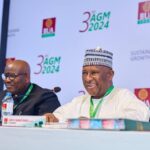President Tinubu initiates a grassroots development initiative following the NEC’s approval of the Renewed Hope Ward Programme.
A significant aspect of the program involves recognizing at least 1,000 economically active individuals in each ward, who will receive support to enhance local manufacturing and business operations.
On Thursday, President Tinubu presided over National Economic Council (NEC) session at the State House in Abuja. During the meeting, he received the backing of the Governors for the Renewed Hope Ward Development Programme. This comprehensive initiative is designed to distribute recent macroeconomic benefits across Nigeria’s 8,809 wards.
The program outlined at the NEC meeting, spearheaded by the Federal Ministry of Budget and Economic Planning, aims to hasten local development by invigorating economic activities, alleviating poverty, and enhancing job opportunities and food security within communities.
After the meeting, Governor Hope Uzodinma of Imo State told journalists that the President’s involvement marks a significant change in strategy, aiming to ensure that the achievements at the federal level translate into tangible benefits at the local level.
He said, “We just concluded the National Economic Council meeting with Mr. President in attendance. The President came up with a programme that will fast-track the process of this additional money creating a bigger impact on Nigerians by making sure that it trickles down to the grassroots.
“The country is earning more money now, the subnational governments are also earning more money.
“A committee will be set up involving the Surveyor-General of the Federation and subnational governments to work together for the early actualisation of these projects.”
Reflecting these views, Senator Abubakar Atiku Bagudu, Minister of Budget and Economic Planning, highlighted that the Renewed Hope Ward Development Programme marks a historic advancement in the government’s reform plans.
He said, “Having stabilized the macro economy, the next step is to drill down development to the lowest levels. We believe this will generate employment, reduce poverty, enhance food security, and even enhance social protection.”
Bagudu clarified that the foundation of the program lies in Chapter Two of Nigeria’s Constitution, which obliges every level of government to foster prosperity and encourage a self-sustaining economy.
Bagudu disclosed that a major aspect of the program involves pinpointing at least 1,000 economically active individuals in each ward. These individuals will receive support to enhance local production and boost commercial activities.





